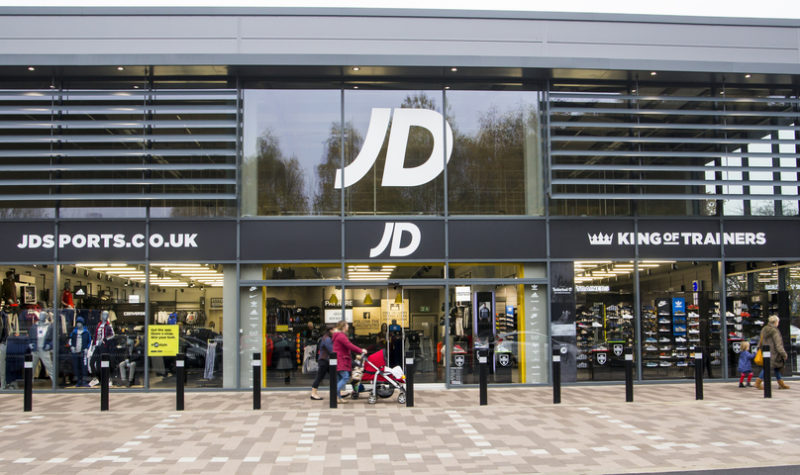JD Sports Fashion: International ambitions could fuel strong long-term returns

CPI inflation may have held steady at 2.3% in March, but it is likely to cause intense pressure for UK consumers in future months. A rate of 3%+ looks likely as a weak pound gradually filters its way through into higher costs for UK consumers.
Looking ahead, things could therefore get worse for UK retailers. Higher inflation has historically caused a squeeze on spending. Last seen in the aftermath of the financial crisis, consumers can postpone spending or trade down to lower-value substitutes if their real-terms income falls. Since inflation is 0.3% lower than wage growth, there is a good chance this will take place.
Therefore, I believe the focus for UK retailers should be on international expansion. A weak pound provides positive exchange rate translation benefits for exporters. That’s a key reason why I’m optimistic about the prospects for JD Sports Fashion (LON:JD) after it confirmed major investment in its non-UK operations this week.
Consumer squeeze
Although inflation is only 30 basis points higher than the Bank of England’s target, any further rise could be enough to cause a fundamental shift in consumer behaviour. The Bank of England believes inflation will reach 2.7% over the medium term, which would be enough to cause a decline in the spending power of UK consumers. Wage growth of 2.6% may have been high a year ago when inflation was 0.8%, but it looks set to be trumped by inflation sooner rather than later.
The effect of this is likely to be an increasingly price-conscious consumer. While convenience, quality and desirability may still matter, they are likely to become more secondary compared to price. In other words, UK consumers may trade down to non-branded items when it comes to a range of discretionary and staple consumer goods. This may lead to a stark choice between margins and sales for many UK retailers. Either way, their profitability is likely to experience pressure which has probably not been seen since the aftermath of the financial crisis.
International opportunity
The main cause of higher inflation is, of course, weaker sterling. It has depreciated by 17% versus the dollar and 10% against the euro since the EU referendum. Although this creates problems for UK retailers, it also brings opportunities. Companies which export goods or services are enjoying a positive currency translation boost from weaker sterling. This allows them to either generate higher profitability, expand into even more territories from the higher investment spending which is available, or else reduce prices to become increasingly competitive versus non-UK rivals.
This obvious advantage of exporting versus importing will lead to a gradual shift away from UK-focused business in my opinion. A greater proportion of companies, especially in retail, will be forced to pivot abroad. While during the financial crisis the domestic market and international markets were challenging, today weak sterling has provided an opportunity for obvious growth outside of the UK. Therefore, I believe there is the perfect mix of ‘carrot and stick’ to persuade UK companies, especially retailers, to shift the focus of their business abroad.
Sustainable growth
One retailer which is embracing the international growth opportunity on offer is JD Sports Fashion. It reported strong results this week, which included a record profit before tax figure. However, the most important part of its results release was the net increase of 54 stores in Europe during the financial year. It also opened two further stores in Malaysia, while the first JD store in Australia is due to open imminently.
More growth in its international estate looks set to be ahead. There is plenty of cash to deliver a significant and prolonged growth plan. For example, the company’s capex in the 2017 financial year was £88 million. This left it with free cash flow of £191 million. Equity dividends paid were only £14.5 million, which means capex could rise by a very large amount in order to provide sufficient investment in its international estate.
If JD did not wish to finance the growth of its international business via its own cash flow, its balance sheet could accommodate higher levels of debt. It has a net cash position of £213 million while its interest coverage ratio was 109 in the 2017 financial year. Given the low interest rate on offer, it would seem sensible to increase leverage in order to generate higher returns further down the line.
Outlook and final word
The valuation of JD could dissuade investment in the eyes of some investors. It has a P/E of 23.1 and yet is forecast to register a rise in EPS of 7% this year and 9% next year. While disappointing on the one hand, the company’s performance in the long run from its international expansion could lead to notably higher levels of profit growth. It may also create a more diversified and lower-risk business which is better able to cope with economic challenges in the UK brought on by Brexit.
Undoubtedly, the outlook for UK retailers is tough. A weaker pound means inflation may surpass wage growth and lead to a fundamental shift in shopping habits. Profitability from UK operations may therefore decline. However, that same set of factors also provides an opportunity for companies to develop their international operations and benefit from a weaker pound. Therefore, while change may not be frictionless, it could create stronger and more profitable businesses in the long run.
JD could prove to be one such business. It has the right strategy at the right time. It also has a balance sheet which could be leveraged, while its cash flow could also pay for a major and prolonged investment in its international operations. Although its valuation may be somewhat heady, the company’s growth prospects in the long run could make it a sound buy. It could be one of the surprise winners from Brexit.
Comments (0)